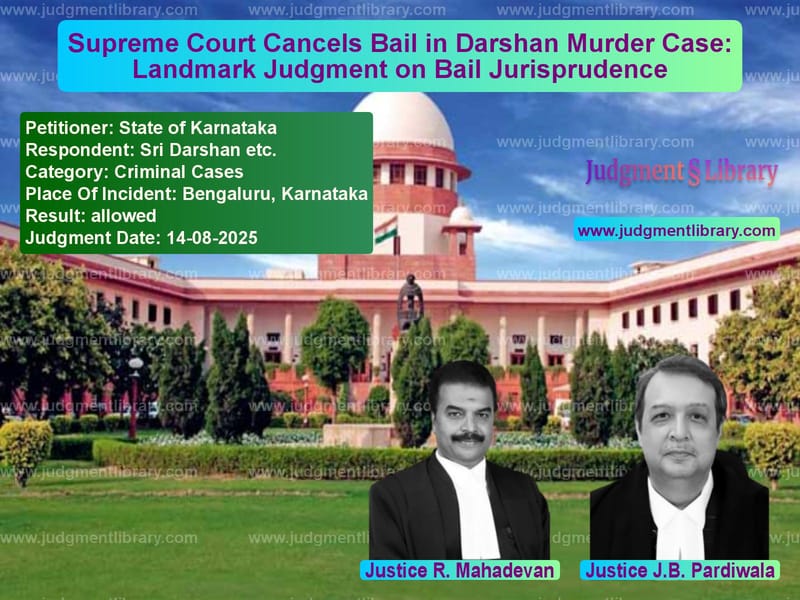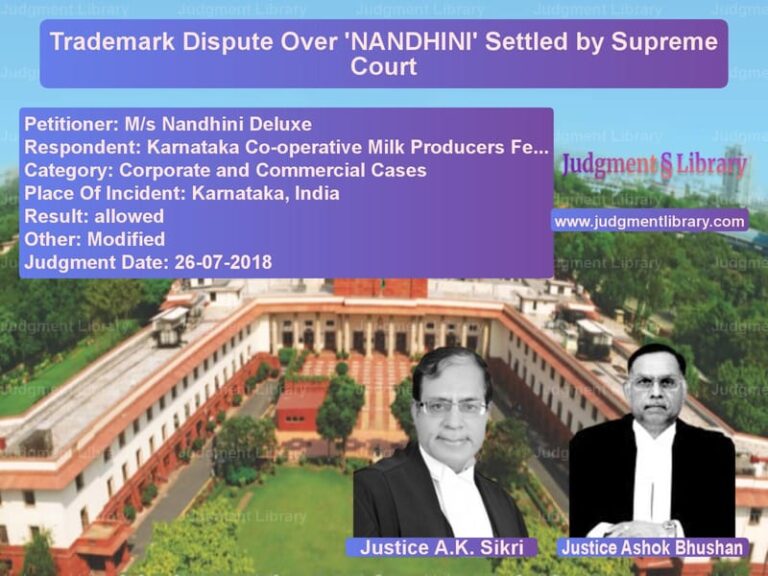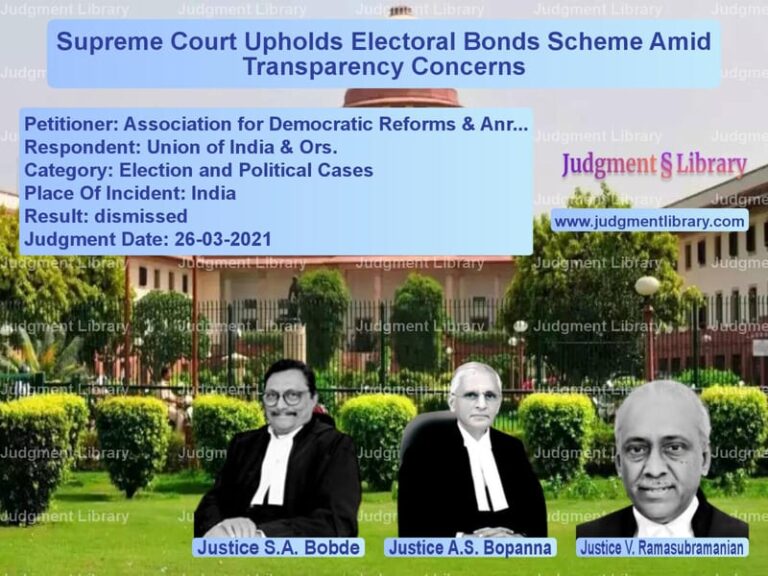Supreme Court Cancels Bail in Darshan Murder Case: Landmark Judgment on Bail Jurisprudence
In a significant ruling that reinforces the principle that no one is above the law, the Supreme Court of India recently set aside the bail granted to prominent actor Darshan and six other accused in a brutal murder case. The judgment delivered on August 14, 2025, sends a strong message about the sanctity of the judicial process and the importance of maintaining public confidence in the criminal justice system. The case involves the alleged kidnapping, torture, and murder of Renukaswamy, a resident of Chitradurga, who was reportedly killed for sending obscene messages to the actor’s partner. The Supreme Court’s detailed analysis of bail jurisprudence and its application to high-profile cases makes this judgment a landmark in criminal law.
The State of Karnataka had appealed against the Karnataka High Court’s order granting bail to all seven accused. The prosecution alleged that the murder was premeditated and brutally executed, with the deceased suffering 39 injuries including 17 fractured ribs and testicular trauma. The Supreme Court found serious legal infirmities in the High Court’s bail order and emphasized that celebrities cannot claim preferential treatment in matters of bail, especially in heinous offences like murder.
Background of the Case
The case originated from an FIR registered on June 9, 2024, at Kamakshipalya Police Station in Bengaluru after the dead body of an unknown male was discovered near a stormwater drain. During investigation, it was revealed that the deceased was Renukaswamy from Chitradurga, who had allegedly sent obscene messages to Pavitra Gowda (A1), who was in a relationship with actor Darshan (A2). The prosecution alleged that this led to a conspiracy to trace, kidnap, and murder the deceased.
According to the prosecution, the accused lured the deceased from Chitradurga to Bengaluru under false pretenses, confined him at a private parking shed, and subjected him to brutal torture before killing him. The postmortem report recorded 39 external injuries, and the prosecution claimed that the accused subsequently disposed of the body to destroy evidence. A total of 17 accused were charge-sheeted, with the seven respondents before the Supreme Court being Darshan (A2) and six others accused of active participation in the crime.
Arguments by the State
Senior counsel Mr. Sidharth Luthra, appearing for the State of Karnataka, made detailed submissions challenging the bail order. He argued that “the impugned order dated 13.12.2024 passed by the High Court is ex facie unsustainable as it is contrary to the material evidence on record and suffers from serious non-application of mind to the facts and law involved.”
Regarding Darshan’s bail on medical grounds, Luthra submitted that “the medical opinion dated 24.10.2024 did not disclose the type of surgery, the prospective date of the surgery, its nature, or the post-operative care required. Despite the vagueness and absence of any indication of urgency, the High Court proceeded to enlarge the first respondent on medical bail for a period of six weeks, without even constituting a medical board to assess the genuineness of the claim.”
The State further contended that “the High Court erred in appreciating key legal provisions and crucial material evidence on record. It failed to properly analyse the offence of abduction under Sections 362 and 364 IPC.” Luthra emphasized that “the brutality of the act stands out starkly: the postmortem report records 39 external injuries, 17 fractured ribs, testicular trauma, and electric burns consistent with torture by shock.”
The State also highlighted the forensic evidence, stating that “DNA of the deceased was found on the shoe worn by Respondent No. 1(A2) recovered pursuant to a Section 27 disclosure made in the presence of two independent witnesses.” Additionally, the prosecution pointed to digital evidence including CCTV footage, call records, and WhatsApp messages that allegedly established the conspiracy and execution of the crime.
Arguments by the Accused
The respondents/accused, through their counsel, raised several procedural and substantive defenses. They contended that “although the respondents were produced before the Magistrate within 24 hours of arrest, they were neither informed in writing of the grounds of arrest nor provided timely access to legal counsel.”
Regarding witness credibility, the accused argued that “one primary eyewitness, CW. 91, gave his Section 161 Cr.P.C statement, 12 days after the incident (incident on 08.06.2024; statement recorded on 20.06.2024). Such inordinate and unexplained delay undermines reliability and suggests afterthought.”
For A1 (Pavitra Gowda), it was submitted that “the prosecution does not allege that Respondent No. 5 (A1) was involved in any manner in the abduction or assault of the deceased, nor is there any telephone link between this respondent and the persons alleged to have committed the offences of kidnapping or murder. The only act attributed to this accused is that she slapped the deceased with a chappal.”
The accused also relied on legal principles governing bail cancellation, stating that “the law on cancellation of bail is well settled: interference is warranted only if there are supervening circumstances such as (i)misuse of liberty by the accused (ii)attempt to influence witnesses or tamper with evidence, or (iii)the order granting bail is perverse or ignores material facts.”
Supreme Court’s Analysis and Reasoning
The Supreme Court began its analysis by distinguishing between annulment of bail and cancellation of bail. The Court explained that “annulment of bail orders refers to the appellate or revisional power to set aside a bail order that is perverse, unjustified, or passed in violation of settled legal principles” while “cancellation of bail typically arises from post-bail conduct or supervening circumstances.”
The Court extensively quoted from its earlier judgments, including Prahlad Singh Bhati v. NCT of Delhi where it was laid down that “While granting bail the court has to keep in mind not only the nature of the accusations, but the severity of the punishment, if the accusation entails conviction and the nature of evidence in support of the accusations.”
Regarding the High Court’s approach, the Supreme Court made crucial observations: “By the impugned order, the High Court proceeded to grant bail to the accused by delving into the merits of the case and recording findings that fall within the exclusive domain of the trial Court.” The Court emphasized that “Courts are not expected to render findings on the merits of the case at the bail stage.”
The Supreme Court particularly criticized the High Court’s treatment of the medical bail plea, noting that “bail on medical grounds can be granted only in exceptional cases where the medical condition is serious, cannot be treated in custody, and necessary facilities are not available in jail.” The Court found that the medical evidence did not support the urgency claimed by the accused.
Celebrity Status and Equality Before Law
In a significant part of the judgment, the Supreme Court addressed the issue of celebrity status in bail matters. The Court unequivocally stated that “the Constitution of India enshrines equality before law under Article 14, and mandates that no individual – however wealthy, influential, or famous – can claim exemption from the rigours of law. A celebrity status does not elevate an accused above the law, nor entitle him to preferential treatment in matters like grant of bail.”
The Court further observed that “Popularity cannot be a shield for impunity. As this Court held, influence, resources and social status cannot form a basis for granting bail where there is a genuine risk of prejudice to the investigation or trial.”
Justice J.B. Pardiwala, in a concurring order, reinforced this principle by stating: “The judgment conveys a very strong message that whoever the accused may be, howsoever big or small the accused may be, he or she is not above the law. This judgment contains a very strong message that the justice delivery system at any level should ensure at any cost that the Rule of Law is maintained.”
Conclusion and Directions
After a comprehensive analysis, the Supreme Court concluded that “the order of the High Court suffers from serious legal infirmities. The order fails to record any special or cogent reasons for granting bail in a case involving charges under Sections 302, 120B, and 34 IPC. Instead, it reflects a mechanical exercise of discretion, marked by significant omissions of legally relevant facts.”
The Court allowed the appeals and set aside the High Court’s bail order, directing that “the bail granted to the respondents / accused persons is hereby cancelled. The concerned authorities are directed to take the accused into custody forthwith.” The Court also directed expeditious trial of the case while clarifying that “the observations made herein are strictly confined to the issue of bail and shall not influence the trial on merits.”
This judgment reinforces the fundamental principles of bail jurisprudence in India, particularly emphasizing that the gravity of the offence, strength of evidence, and potential for witness tampering must be carefully considered in bail applications, regardless of the accused’s social status or influence.
Petitioner Name: State of Karnataka.Respondent Name: Sri Darshan etc..Judgment By: Justice R. Mahadevan, Justice J.B. Pardiwala.Place Of Incident: Bengaluru, Karnataka.Judgment Date: 14-08-2025.Result: allowed.
Don’t miss out on the full details! Download the complete judgment in PDF format below and gain valuable insights instantly!
Download Judgment: state-of-karnataka-vs-sri-darshan-etc.-supreme-court-of-india-judgment-dated-14-08-2025.pdf
Directly Download Judgment: Directly download this Judgment
See all petitions in Murder Cases
See all petitions in Bail and Anticipatory Bail
See all petitions in Criminal Conspiracy
See all petitions in Judgment by R. Mahadevan
See all petitions in Judgment by J.B. Pardiwala
See all petitions in allowed
See all petitions in supreme court of India judgments August 2025
See all petitions in 2025 judgments
See all posts in Criminal Cases Category
See all allowed petitions in Criminal Cases Category
See all Dismissed petitions in Criminal Cases Category
See all partially allowed petitions in Criminal Cases Category







